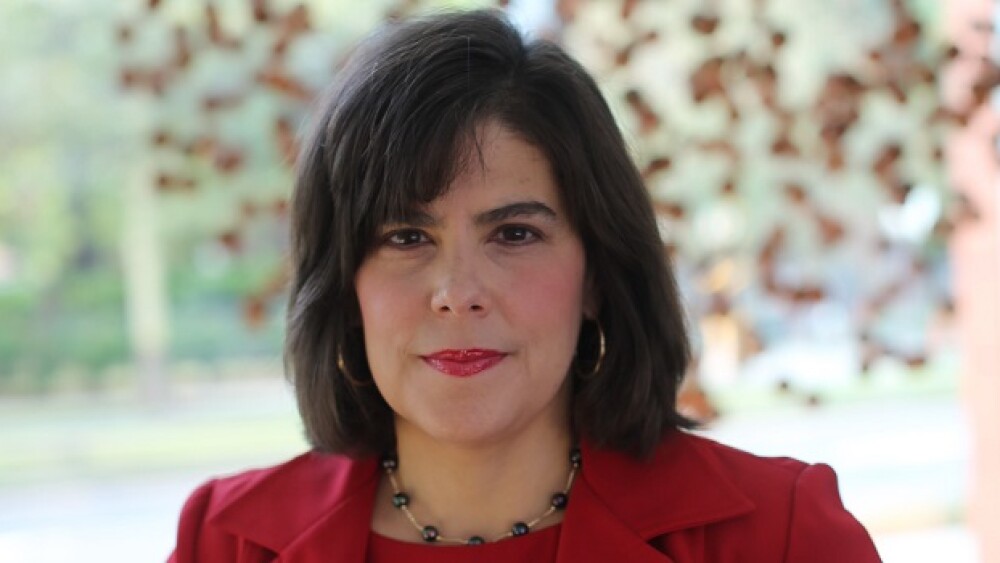After an FDA advisory committee voted 17-1 against approving NurOwn last month, BrainStorm executives Wednesday laid out a potential path forward for the experimental amyotrophic lateral sclerosis treatment.
Pictured: BrainStorm Co-CEO Stacy Lindborg/BrainStorm Cell Therapeutics
After an FDA advisory committee voted 17-1 last month against approving BrainStorm Cell Therapeutics’ amyotrophic lateral sclerosis hopeful NurOwn, the company isn’t waiting for the Dec. 8 PDUFA date. Instead, it is withdrawing its Biologics License Application and conducting a Phase IIIb clinical trial.
BrainStorm said its decision to withdraw the BLA was coordinated with the FDA and is seen by the regulator as a withdrawal without prejudice.
On Sept. 27, the FDA’s Cellular, Tissue, and Gene Therapies Advisory Committee voted that there was not currently substantial evidence to support NurOwn’s efficacy as a treatment for mild-to-moderate amyotrophic lateral sclerosis (ALS).
“While we were disappointed with the outcome and we disagree with the panel’s conclusion, it is important for us to anticipate how it’s likely to influence the FDA’s decision to approve NurOwn based on the evidence under review currently in our BLA and make decisions that are likely to lead to an approval for NurOwn for ALS in the most efficient path,” BrainStorm CEO Chaim Lebovits said on a conference call Wednesday.
Lebovits said the decision to conduct another Phase III trial is “the only path forward” for NurOwn in ALS. He added that BrainStorm will meet with the FDA to discuss the design for the Phase IIIb trial.
Throughout the adcomm, BrainStorm executives emphasized a subgroup analysis of trial participants with ALSFRS-R scores 35 and above at baseline. Co-CEO Stacy Lindborg said Wednesday a 19% treatment response rate over placebo was observed on the primary endpoint and that the Phase IIIb trial will likely focus on this mild, or less advanced, patient population.
Original article published Sept. 27
After a long day of deliberations, the FDA’s Cellular, Tissue, and Gene Therapies Advisory Committee late Wednesday voted against approving BrainStorm Cell Therapeutics’ experimental amyotrophic lateral sclerosis therapy, NurOwn, by a vote of 17-1.
The primary question put before the adcomm was: Do the data presented demonstrate substantial evidence of effectiveness for treatment of mild to moderate ALS?
Overall, the panelists cited “conflicting” information and a “lack of efficacy” in terms of survival and statistical evidence that didn’t meet the regulatory requirement. Almost to a person, they expressed compassion for ALS patients and applauded BrainStorm for its efforts before explaining their rationale.
Rajiv Ratan, Winifred Masterson Burke Professor at Weill Cornell and CEO of the Burke Neurological Institute, said he was “not compelled by the clinical data presented or the evidence of quality control of the stem cells or target engagement.”
The sole voting patient representative, Andrew Buckley, also voted no, stating, “I didn’t find that [NurOwn] was effective. It seems to me like there’s more evidence to the contrary.”
However, Kathleen O’Sullivan-Fortin, founder of ALD Connect, voted yes, saying, “I think there’s no bigger risk than imminent certain deaths from ALS and these are unique and desperate circumstances that would require us to exercise flexibility.”
Nirali Shah, a physician-scientist at the National Institutes of Health and the one abstaining panelist, said that based on the patients’ and caregivers’ statements, she thought “there was something there” but said she abstained due to “a fair amount of conflicting information.”
A Troubled Regulatory Journey
NurOwn is nearing the end of a three-year-long regulatory saga that began in February 2021 when the FDA discouraged BrainStorm from filing a Biologics License Application. In August 2022, armed with a correction to its Phase III data analysis, the company announced that it would submit a BLA—which was rejected in November of the same year. BrainStorm leveraged the FDA’s File Over Protest procedure to file the BLA anyway and was granted an adcomm meeting in March 2023.
Ahead of the adcomm, the FDA issued briefing documents expressing issues with the cell therapy’s manufacturing plan and reiterating the position it took in its Refuse to File letter, saying the company failed to demonstrate substantial evidence of efficacy in its BLA.
While the Israel- and New York-based company defended the analysis of its Phase III trial, the FDA remained steadfast in its viewpoint on the cell therapy.
Celia Witten, deputy director of the Center for Biologics Evaluation and Research (CBER), opened the proceedings by revealing that BrainStorm was now seeking an indication of mild to moderate ALS—which she said was based partly on subset analysis—as opposed to a broader ALS population. Witten noted that the issues raised by the FDA in the briefing documents were also relevant to this subset of patients and stated the FDA’s position that “In this particular case, the subset analysis does not provide substantial evidence of effectiveness.”
In the briefing documents issued Monday, the regulator called BrainStorm’s manufacturing information “grossly deficient.” BrainStorm co-CEO Stacy Lindborg, who led the company’s adcomm presentation on Wednesday, acknowledged that additional work is required to “fully satisfy” the FDA’s requirements and said the company would work with the agency to ensure its cell manufacturing meets all requirements and specifications.
In an interview with BioSpace following the adcomm, Lindborg expressed disappointment that BrainStorm didn’t have a chance to answer many of the questions presented to the company.
“I think the analyses resulted in outcomes or conclusions that were conflicting, but there were reasons why and I think that’s what we would have really loved for the discussion to be around,” she said.
The FDA is not required to heed the advice of its advisory committees but often does. The regulator has set an action date of December 8, 2023, before which it is expected to render its decision on NurOwn.
Heather McKenzie is a senior editor at BioSpace. You can reach her at heather.mckenzie@biospace.com. Follow her on LinkedIn and X @chicat08.






